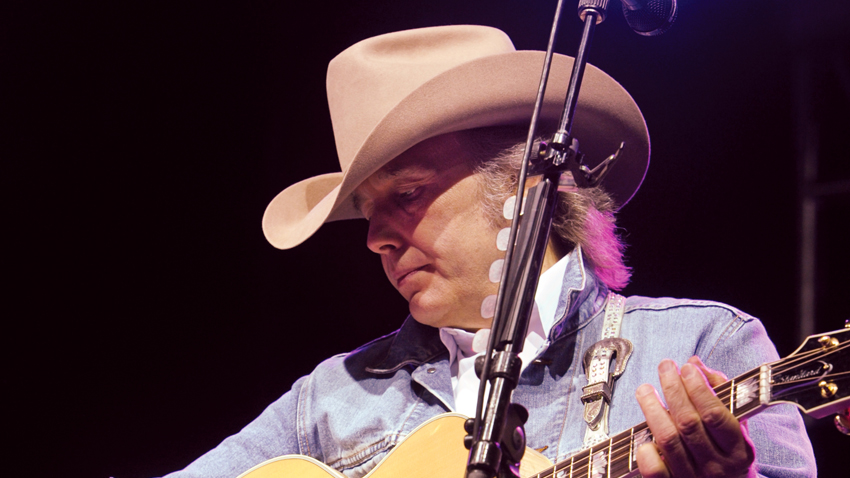
A jukebox waltz for grown-ups—Dwight Yoakam lets “Sad, Sad Music” do what real country always has: tell the truth softly enough that it hurts.
Before the first Telecaster lick fades, place the record on the right shelf. “Sad, Sad Music” is track five on If There Was a Way (Reprise, released October 30, 1990), produced by Pete Anderson and cut at Capitol Studios, Hollywood. It wasn’t pushed as its own A-side; instead, it lived inside one of Yoakam’s most finely drawn albums and later surfaced on wax as the B-side to “Nothing’s Changed Here,” the third single, which peaked at No. 15 on Billboard’s Hot Country Songs (July 29, 1991 release). On album pressings the tune runs roughly 3:44–3:53 depending on edition. The parent LP itself climbed to No. 7 on Top Country Albums and No. 96 on the Billboard 200.
The song’s story is the album’s story: a man walking through a house where love used to live. Across If There Was a Way, Yoakam keeps circling the same ache—the presence that feels absent, the bed still warm with memory—and “Sad, Sad Music” distills that mood without fuss. He doesn’t shout or sermonize; he uses everyday pictures and leaves the camera steady. Biographers and liner-note writers have long singled out the album’s thread of distance and disappearances, and this cut sits right at that seam: the narrator wakes into a morning that remembers yesterday too well. It’s classic Yoakam—plain language, no self-pity, just the full weight of what isn’t there anymore.
On the tape, Pete Anderson keeps the arrangement lean enough to see the grain. A dry, close snare marks time; electric guitar answers like a friend who knows when to speak and when to listen; Tom Brumley’s steel floats in the margins like light under a door; Scott Joss threads quiet fiddle and mandolin colors. This is the Bakersfield grammar Yoakam revived in the ’80s, matured by 1990 into something both tougher and more forgiving—no syrup, no studio perfume, just the honest rattle of a small band in a good room. You can practically feel Capitol’s wood and glass under the track.
Why it lingers—especially for older ears—has to do with tone. The title promises melodrama; the record refuses it. Yoakam sings a little behind the beat, the grain in his high baritone turning resignation into something like grace. When the chorus turns, there’s no big modulation, no grandstanding solo. What you get instead is composure: the sense that the only way through a long afternoon is to let the radio play the kind of music that names what you’re feeling and then keeps you company until the light changes. It’s a small miracle of restraint, and it’s why the song has aged so gently.
The album context matters. If There Was a Way is one of Yoakam’s richest blends—country to the bone, yet happy to borrow a little soul sway and rock snap where it helps the truth land. It’s the set that gave him five Country Top-40 entries—“Turn It On, Turn It Up, Turn Me Loose,” “You’re the One,” “Nothing’s Changed Here,” “It Only Hurts When I Cry,” “The Heart That You Own”—but the deep cuts do the persuading. “Sad, Sad Music” is one of those: a quiet backbone for a record about estrangement and stubborn hope, placed mid-sequence exactly where a long afternoon sags and a listener needs steadiness more than spectacle.
There’s a fine afterlife as well. A decade later, Yoakam rebuilt the song for his stripped studio set dwightyoakamacoustic.net (2000), shaving it to just over two minutes and letting the lyric stand on bare rhythm guitar. That acoustic take reveals what was always there under the band’s polish: a melody that holds without help and a writer who trusts quiet. Spin the two versions back-to-back and you hear the same instinct operating at different volumes—the studio cut keeping you company in a half-lit bar, the acoustic reading talking to you across a kitchen table.
What, finally, does the song mean? Not that sadness is fashionable, or that misery loves company. Rather, that music is a kind of furniture in a life—it holds you up when you’re too tired to stand straight, it keeps you from leaning on the wrong wall. “Sad, Sad Music” understands the small heroism of getting through the day and the deep, ordinary courage it takes to admit you don’t feel brave yet. It’s a grown person’s hymn: measured, forgiving, unembarrassed about tenderness.
Play it now and the years fall away. The drum still ticks like a clock you’ve stopped hearing, the steel still glows at the edges, and Dwight Yoakam still sounds like a man telling the truth in a voice that doesn’t need raising. Not a hit single, not a headline—just a keeper. The kind of cut you don’t brag about loving because you don’t have to. You put it on, and the room understands.